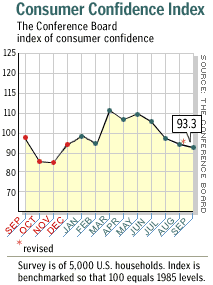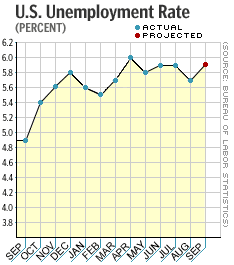NEW YORK (CNN/Money) -
Economists are spending a lot of time fretting about how American consumers are feeling, which of late has been a frustrating endeavor.
Those consumers are giving them mixed signals. On the one hand, they express growing pessimism in confidence surveys. On the other, they continue to spend money anyway.
What message are they sending? Are consumers in essence saying they'll spend no matter how they feel -- or are they saying they're going to stop spending soon?
Economists care about the answer, because consumer spending makes up about two-thirds of the nearly $10 trillion U.S. economy.

Showing astonishing resilience, consumers spent money during a recession that began in March 2001. They spent money after the terror attacks of Sept. 11, 2001. They spent money after learning of scandals at Enron, WorldCom and elsewhere. They spent money after stock prices plunged this summer.
And they often did that spending even while they were telling the Conference Board and the University of Michigan -- compilers of the two most closely watched U.S. consumer sentiment surveys -- how unhappy they were. (To respond to a sample of the questions the University of Michigan asks in its monthly survey, click here.)
After the Sept. 11 attacks, for example, the Michigan sentiment index plunged from 91.5 to 81.8, the lowest level since 1993. The Conference Board's index plunged from 97 to 85.5, the lowest level since 1994.
Retail sales, on the other hand, jumped a whopping 6.2 percent from September to October 2001, easily the biggest jump since the Commerce Department started keeping track in 1992.
And total consumer spending rose at a 1.5 percent rate in the third quarter of 2001 and an enormous 6.0 percent rate in the fourth quarter, the strongest pace since 1997, pulling the U.S. economy out of recession.
It would seem, based on these and other examples, that spending and sentiment aren't closely tied together at all.

"I don't think [the confidence measures] tell you that much about what the consumer is going to do," said Merrill Lynch economist Gerald Cohen. "I always tell people to look at what consumers do and not what they say."
Though both the Conference Board and Michigan confidence indexes fell in September, most economists believe consumer spending will be strong in the third quarter, lifted by robust automobile sales.
Most economists also believe spending growth will slow in the fourth quarter, but few think it will fall too significantly, meaning the economy's in no danger of falling back into recession.
And Conference Board economist Ken Goldstein pointed out that, though consumers have grown increasingly unhappy with current economic conditions, they continue to be optimistic about the future, according to the firm's expectations index, which rose in September.

"They're saying the economy stinks this summer, for whatever reason, but their anticipation is that it will turn for the better," Goldstein said.
That optimism could keep consumers spending. Another boost could come from ever-falling mortgage rates, which have enabled homeowners to refinance for lower monthly payments while driving demand for houses, making homes more valuable and homeowners feel richer.
Even though spending on automobiles, fueled this summer by offers of zero-percent financing, is likely to cool off in the fall, people have to keep buying food, clothing and other necessities, meaning consumer spending rarely drops too far.
"We haven't had a single year of falling consumer spending since 1938," said Salomon Smith Barney economist Steven Wieting. "There's no boom or bust in consumer spending."
While real wage growth, the annual rate of change in average hourly earnings adjusted for inflation, has fallen in the past two months, the Federal Reserve has long maintained that strong productivity growth, which allows companies to produce goods at a lower cost, keeps other prices low and increases consumers' standards of living.
With this and already low interest rates in mind, the Fed decided last week to leave its target for short-term interest rates unchanged, indicating it wasn't yet too alarmed about the future of consumer spending or its impact on the economy.
If the Fed and other economists are wrong, however, and consumer spending growth does slow significantly, it could be enough to drag the economy back into recession in the fourth quarter.
On Monday, the Commerce Department that consumer spending grew just 0.3 percent in August, compared with 1.0 percent in July, even as income rose 0.4 percent. Economists, on average, expected spending to rise 0.5 percent, according to Briefing.com.
In retail sales, especially, there have been recent troubling signs. Wal-Mart (WMT: Research, Estimates), Target (TGT: Research, Estimates) and other retailers are saying they expect to report disappointing September sales in stores open for a year or more.
And the most worrisome thing about these forecasts is that September sales were supposed to be especially strong, since they're being compared with last September, when the economy virtually shut down for several days after the Sept. 11 attacks.
"Consumers are extremely cautious today, and that caution has not really very much to do with consumer confidence indexes," said Kurt Barnard, retail analyst and publisher of Barnard's Retail Trend Report. "It's related almost exclusively to one item, one four-letter word: jobs."
Though the nation's unemployment rate is still much lower than the 7.8 percent peak it reached following the 1990-91 recession and the 10.8 percent peak after the 1981 recession, job growth has been dead in the water all year, following nearly 1.8 million job cuts between April 2001 and April 2002.
Until businesses see a need to expand their production, they will see little reason to hire more workers, meaning job growth could remain stagnant for months, keeping a lid on consumer spending growth.
"Until we have the economy operating on all eight cylinders, it will feel pretty awful to most companies and most consumers," said Mike Niemira, senior economist at Bank of Tokyo-Mitsubishi Ltd.

|

